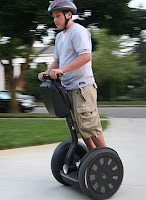Six of my predictions for 2012
The end of any year is a great time to think about the year that’s ending, and the year that’s coming up.
2011 was the year in which we got the iPad 2 and the Kindle Fire. It was the year in which social media helped to fuel an “Arab-spring” and in which AT&T didn’t acquire T-Mobile. Netflix did the Qwikster fake-out and then back-pedaled. HP got Meg Whitman. 2011 was the year in which we lost Steve Jobs.
For 2012, I’m prepared to say that the following six predictions are, uh, "sure things." Or at least I think they are very likely.
- The four largest, national US mobile carriers, Verizon, AT&T, Sprint and T-Mobile, will change in a way that results in only three national carriers standing. That may be through an acquisition, through a merger, or through an outright failure.
- Verizon will have enough of a 4G rollout in the USA to legitimately call it “nationwide” in 2012. AT&T will be close behind. LTE will win as the dominant 4G technology.
- Research In Motion (RIM), makers of the Blackberry handhelds, will receive one or more legitimate, unsolicited acquisition bids. And they’ll seriously consider them, because they need to. It isn’t clear how much longer they’ll be viable along their current trajectory.
- Apple will announce and ship iPad 3 in the first half of 2012. It’ll have the high-density "retina" display. Apple will not release a 7” or 8” tablet in 2012 unless the Kindle Fire or B&N Nook take a big bite out of iPad sales. I don’t think that will happen, because I think the three tablets can share the market quite well for at least another year.
- The Kindle Fire and Barnes & Noble Nook will continue to sell well, and a second revision of each will be released in 2012, improving in small ways based on early user feedback, while maintaining the low prices that make them a winner in a slice of the market in which the iPad does not play.
- No SOPA, no PIPA. We won't even get the OPEN act. None of the US legislation currently proposed and being considered in congress to fight foreign intellectual property theft or copyright infringement will make any real progress, let alone be signed into law. This will be less about congressional caution and more about congressional impotence. But in this case, I'm not complaining.
That's my 6! Do you have predictions to share? Do you disagree with some of mine? Leave a comment and let us know!
See you in 2012.
Thanks for reading!
If you enjoy this blog, please +1 it below, share it on Facebook, Google+ or Twitter, or suggest it to your friends. More readers will drive more discussion.













